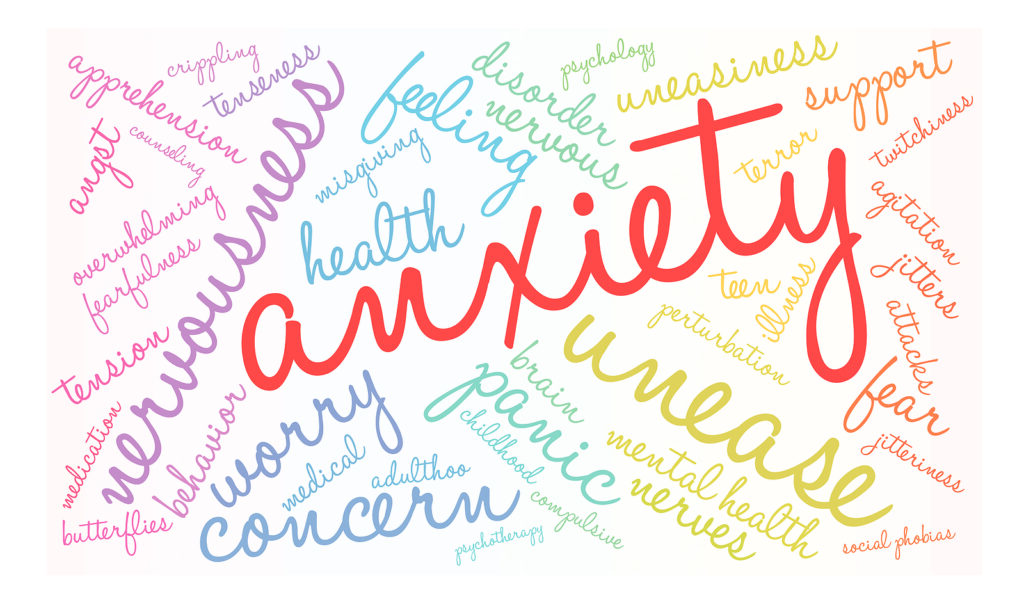When your teen was younger, it might’ve been fun to point out things that gave them “butterflies,” like driving down a steep hill or reaching new heights on a swing set. But butterflies in your stomach can signal something a little darker: anxiety. Your teen may be experiencing normal nerves and emotions, but do you know if your teen is suffering from something more serious? Research shows that one in every three teens experiences anxiety that goes above and beyond normal teenage worries.
Characterized by:
- muscle tension
- shakiness
- nausea and
- sweating
Anxiety is the feeling of intense worry. Anxiety can be a great flagging device for danger, but for a teenager who’s navigating a new social landscape and significant brain development, anxiety can make it hard to function. When anxiety begins to interfere with multiple areas of your teen’s life it may be time to seek help.
While therapy and medication are proven to be effective treatment options for anxiety, let’s talk through some other ways you can help your teen manage their anxiety.

1. Practice Active Listening Over Teaching
Acknowledge whatever worries your teen, and try not to dismiss or ignore them. Saying things like, “That’s nothing to be worried about,” or “Come on just get over it” feel dismissive and can make your teen feel unable to come to you with their anxiety symptoms. Instead, show that you take their anxiety seriously and that you also believe in their ability to work through it. Patiently wait for your teen to put their feelings into words. Try not to cut them off or rush to complete sentences.
This gives them the chance to practice identifying their own emotions, and awareness is the first step in successfully managing anxiety. Active listening in this way also communicates that you care and want to understand them better. This can create a safe and supportive environment for your teen to learn new skills to manage his or her anxiety.
2. Gently Encourage Them to Face Their Fears to Manage Anxiety
The keyword here is “gently.” Teenagers are more independent than children but more dependent than adults. Because of this, you must give them support and structure balanced with appropriate independence and the power to say “no.”
Help them set small goals to chip away at their anxiety. Brainstorm together, but try not to step in and take charge as they’re learning independence. If they get it wrong (spoiler alert: they will) be a safe place for them to get support and build up the courage to try again.
3. Specifically Tell Them When They do a Good Job
Attempt to notice times when anxiety didn’t consume them, or when they were able to move forward in spite of their anxiety. For example, you could say, “I saw you went on a run around the block this morning. I’m really proud of you! I know you want to feel comfortable in a public gym, and I think this is a brilliant first step.”
Try not to make a big deal on days when their anxiety wins. Instead, remind them how much you believe in them and the small steps they’ve taken so far. You are on the right track to helping your teen manage their anxiety.
4. Show Your Teen Love and Support Often
Anxiety isn’t the kindest voice to have in the back of our heads. Teens can be clouded with mental messages like “You’re doing too much,” “You’re not doing enough,” “You sound annoying,” and “What will other people think of me.”
Expressing genuine compliments, reminders that you love them, and hugs that show your teen you’re always there for them can go a long way in building their feelings of self-worth. This can also validate your teen that you have confidence in them. When your teen is anxious, they’ll want to turn to whoever they feel supports them the most. Create a relationship with your anxious teen where the person they turn to is you.

5. Separate the emotion to manage your teen’s anxiety
Avoid calling them shy or anxious when describing who they are to others. This would look like saying, “Wow, anxiety is telling you some lies today,” instead of, “You are so anxious right now!” Anxiety is an emotion, not a personality trait. The more your teen can separate themselves from their anxiety, the better they can overcome it.
6. Encourage Self-care and Mindfulness
If your teen hasn’t mastered making time for themselves yet, help model it for them. Plan an afternoon to do their favorite activity, read together at a public park, or take them out to dinner with a close friend. Encourage them to think and talk about what they might be feeling. Journaling, pausing and taking deep breaths, disconnecting from their devices, or spending time in nature are great examples of mindfulness. Reconnecting with their body and mind in a calm and consistent manner can help bring awareness and an increased ability to manage emotions that tend to get the better of them.

7. Encourage a Healthy Lifestyle
We can all agree that adolescent-related stress takes a toll on those poor teenagers. Raise your hand if you’d like to relive your teenage years (keeps hand firmly in pocket :). Add to that some real anxiety and we’ve got a recipe for some really difficult years. Help your teen deal with that stress by building a life around them that is healthy and sustainable. Play sports as a family, plan healthy meals, encourage good sleep patterns, and of course, avoid drugs and alcohol. We know that these factors can aggravate anxiety and harm a developing brain.
Anxiety is more common than you know
Teenage anxiety is very common, and as teens learn to regulate everyday stress and navigate various social situations anxiety can become less overwhelming. But if you notice that your teen isn’t doing well, finding a good therapist can be helpful. Watch for things like your teen isolating, avoiding things he/she used to enjoy, changes in eating or sleeping patterns, grades changing and motivation decreasing. Even if you can’t quite put your finger on it, if something just doesn’t feel right speaking with our therapists for teen anxiety may help.
You and your teen do not have to struggle through anxiety alone. Anxiety is treatable. Start implementing these tips with your teen and get on the path to helping your anxious teen feel better.
Get Support from a Therapist for Teen Anxiety in American Fork, UT!
You have decided to take a break, and that’s perfectly fine. We know you want your teen to be happy. Allow our anxiety therapists to assist you. Anxiety therapy for teens provides support for your teenager, helping them feel confident and free to thrive in life. By empowering your teenager, therapy helps them grow stronger. You can help your teen manage their anxiety by getting them the help they deserve. To get started with The Family Therapy Clinic in American Forks, UT, follow these steps
- Contact us or call/text (385) 308-2700.
- Schedule your teenager for their first therapy session.
- Meet our therapists for teen anxiety
- Watch them enjoy the things they love again!
Other Mental Health Services
We know life is complicated and you may be struggling with more than one issue. Or perhaps you know someone in your family that needs some support right now. Our experienced therapists at The Family Therapy Clinic offer a wide range of mental health services at our office in American Fork, Utah. Some of our specialties include adult anxiety, post-divorce therapy, and more.

[…] gradually over time and can begin at any point in life; typically symptoms are present by the teenage years. Most people who receive an anxiety diagnosis in adulthood can look back and identify ways anxiety […]